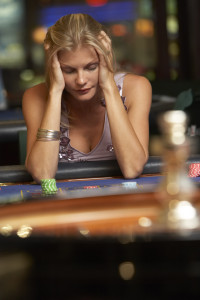 A new study from Yale University establishes a link between gambling addiction and obsessive compulsive spectrum disorder, suggesting that gambling may be more of a compulsion than an impulse for some patients. This study builds on previous research that revealed a link between pathological gambling and addictive behavior.
A new study from Yale University establishes a link between gambling addiction and obsessive compulsive spectrum disorder, suggesting that gambling may be more of a compulsion than an impulse for some patients. This study builds on previous research that revealed a link between pathological gambling and addictive behavior.
Gambling Addiction: Impulse Or Compulsion?
Researchers at Yale are aiming to classify gambling as an impulsive or compulsive behavior. The paper’s senior author, Marc Potenza, is a professor of psychiatry at the Yale School of Medicine. He wrote, “We were trying to understand the relation between pathological gambling and other disorders. There has been some debate in the literature about how best to consider pathological gambling — whether it might fall along the impulsive-compulsive spectrum or be thought of as an addiction without the drug.”
Twin Study Of Gambling Addiction
To test their theories, researchers from Yale conducted a twin study, where they assessed twins from the Vietnam Era Twin Registry to understand the connection between pathological gambling and obsessive-compulsive behavior. Twin studies allow researchers to decipher results more easily because they can distinguish between environmental and genetic factors that may influence diseases and behaviors.
The twin study showed a correlation between problematic gambling and latent obsessive-compulsion. The study also revealed a possible genetic component to gambling addiction, with twins maintaining similar behaviors despite variations in their adult lives.
What This Indicates About Gambling Addiction
Because the Yale University study only looked at male twins, it cannot be used to generalize information about all addictive gamblers. With that in mind, it is possible that pathological gambling is the result of obsessive compulsive behaviors, not just a lack of impulse control. If you suffer from OCD and gambling addiction, treating your compulsions may help eliminate other problems in your life. You can work with a counselor to determine the best treatment path to follow.
Signs Of Gambling Addiction
An estimated 5-7% of Americans struggle with gambling addiction. Common signs of gambling addiction include:
- Depression Or Anxiety After Gambling
- A “High” Feeling After Gambling That Makes You Go Back For More
- Decreased Sleep
- Increased Irritability And Anger When You Want To Gamble
- Borrowing Money To Gamble
- Hiding Money For Gambling
- Thoughts Of Suicide With Relation To Gambling
- Gambling To Win Money To Cover Your Debts
- Participating In Illegal Gambling Activities
If you or someone you know exemplifies any of these behaviors, seek gambling addiction therapy to treat your symptoms and take control of your life once again.

